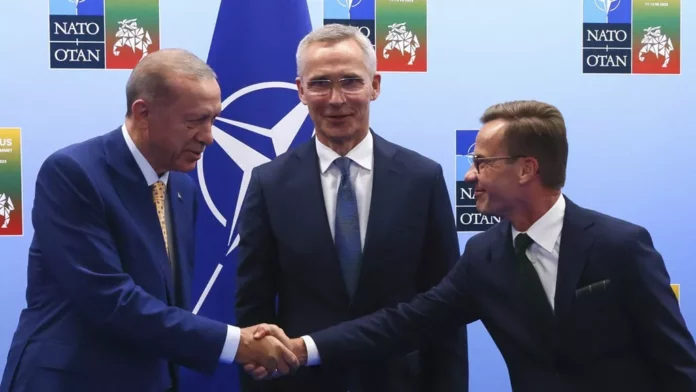Turkey, with which the European Union is trying to revive relations marked by more lows than highs, has resigned itself for two years to a more conciliatory policy with its partners and neighbours.
Turkey calms the game step by step. The regime of Recep Tayyip Erdogan, whose diplomacy in recent years seemed aimed at getting angry with as many of its Western partners as possible, is piloting a clear lull.
It is true that it needs Western capital to finance a structurally high deficit in its balance of payments (around 10% of GDP since the start of the year) and that this member of NATO can hardly maintain execrable relations with its military allies, for lack of a credible alternative. Washington has to remind him of this from time to time.
Beginning of appeasement
This prudent diplomatic reorientation pushes the European Union, whose foreign ministers worked on the issue on Thursday, to try to revive its relations with this neighbor as annoying as it is unavoidable. The war in Ukraine marked a turning point, since Turkey imposed itself as the only mediator approved by both kyiv and Moscow in this conflict.
A position not devoid of ambiguity, which worries the Twenty-Seven. If Turkey sponsored the precious agreement, denounced Monday by Moscow, which allowed for a year the resumption of Ukrainian grain exports, it is also one of the countries discreetly allowing Russia to circumvent Western trade sanctions.
Still, the Turkish president, comforted by his re-election at the end of March, lifted his veto on Sweden’s entry into NATO at the Vilnius summit ten days ago. Not without asking in exchange for a relaunch of negotiations for accession to the European Union. The latter have been at a standstill since 2018, due to decisions by Ankara deemed contrary to the interests of the EU and “a continuous and worrying decline in the rule of law”.
Oil on the fire
The Twenty-Seven do not, however, claim to be considering a relaunch of these negotiations, but have said they are ready to discuss the 1995 customs union agreement between Turkey and the EU in order to promote more trade, and the visa regime, to possibly ease the conditions for entry of Turkish nationals into the Union.
Turkey also has a means of pressure on the European Union, since it is in the front line to accommodate refugees from the war in Syria, even migrants from the Middle East, whom it regularly threatens to let go back to Europe if its financial or political demands are not met.
A means of pressure that risks waning as demand is mounting in Turkish public opinion, including within the ruling AKP party, to simply send all or part of these four million refugees home, now that the Syrian civil war is de facto frozen.
However, Erdogan has not abandoned his fiery rhetoric aimed at immigrants from a secular France with which relations have rarely been cordial for the past fifteen years. He thus affirmed that the recent riots in France were solely caused by “rampant Islamophobia”… Chins are also still frequent in the direction of Greece, against a backdrop of territorial claims in the Aegean Sea.
A Middle East in full recomposition
Further east, the ongoing reconstruction in the Middle East, with the beginnings of reconciliation between Iran and Saudi Arabia and the all-out normalization of Israel’s relations with Arab countries, is also forcing the Turkish regime to adjust its game. Erdogan had to admit that the Syrian regime of Bashar al-Assad, whom he until recently described as a bloodthirsty tyrant, would not fall, and was even in the process of reintegrating into the Arab world. The Turkish president admitted last August that it was time for “new steps” with Damascus.
Ankara has also undertaken to reconnect with Riyadh, after a major anger following the assassination of the Saudi opposition journalist, Jamal Khashoggi, in the Saudi consulate in Istanbul in 2018. On the other hand, nothing conclusive has been recorded recently likely to appease the rivalry between Turkey and Iran.
Finally, Israeli Prime Minister Benjamin Netanyahu will be received in Turkey on July 28 by President Erdogan during a state visit, the two capitals announced. A first since 2008 when the relationship between Ankara and Jerusalem is tumultuous.
urkey has recognized Israel almost from its birth, a special case in the Muslim world, and has long maintained military and technological cooperation, before relations were dramatically strained in 2010 because of the Israeli-Palestinian conflict. The Turkish president will also receive the head of the Palestinian Authority Mahmoud Abbas on July 25.
This article is originally published on lesechos.fr




